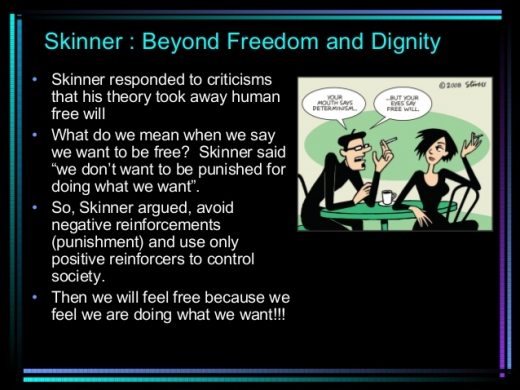
Is total freedom beyond human, American ability to
"Beyond Freedom and Dignity, by B. F. Skinner" [Commentary]
It is now familiar in the teaching and publishing world to be confronted by aroused and militant scientists who wish…
Harold Kaplan 1972-02-01 Harold Kaplan / Feb. 1, 1972
"Speaking for an aggressive sect of social scientists, B. F. Skinner, for long the most famous of behaviorist psychologists, has written the culminating book of his career, Beyond Freedom and Dignity, which can be interpreted as nothing less than a bid for power by a new leader class, called, in his words, the “technologists of behavior.” The book therefore rightly commands the wide attention it has received."
"The primary purpose of Skinner’s book is not to set up a model for the future so much as to eliminate the psychological obstacles in its path. He has unlimited confidence in the capacity of behavioral science to solve human problems; what he doubts is our will to use it. The chief obstacles are generated from what he calls the “literature of freedom and dignity.”"
Skinner is very vague about the "literature."
" . . . troublesome postulate is the concept of individual autonomy in the ethical sphere, the responsibility and the right to choose behavior. The principle had its source not only in man’s higher responsibility to God in his conscience, but also in his right to resist force from men who wished to control his behavior. The difficulty for Skinner, putting both God and primitive violence aside, is the task now of making men amenable to control, that is, conscious, sophisticated control in the modern “scientific” sense. Control, conditioning, we have always had, but it was masked. The problem now is how to pursue a direct and purified technology of control, which though peaceful and benign, is still likely to arouse men’s prejudices on behalf of “freedom” and “dignity.”"
This sounds crazy, but maybe it is time for "control" of behaviors by Government or at least by scientists and "doctors."
"In his book Skinner proposes that the science of behavior has an answer not only about what people do but whether what they do is good for them. What is good for people should be described, Skinner says, as the “reinforcing effects of things.”"
More from this source.
"The moral imagination of men like Skinner, scientists who must use definite criteria in their laboratories, has been chiefly stimulated by the crisis psychology of our civilization. This gives them boldness today and very wide appeal. They are concerned about things like overpopulation, the waste of natural resources, pollution, the threat of nuclear extinction. It may be that our problem is indeed that of survival before anything else, and we need the ministrations of social doctors and engineers, but their prescriptions will not make a culture. At best they can keep it alive.
Whether we live in a democracy or an authoritarian state, as men we wish to have rapport with our “controllers.”"
It is about "cultural engineering."
"Cultural engineering is a conceptual approach to cultural development planning and management that takes into account the changing concepts of culture and the design of practical strategies for dealing with issues and problems raised by culture and development in diverse contexts…."
http://secretengineer.com/cultural-engineering/
"Cultural Engineering."
Home
CULTURAL ENGINEERING Cultural Engineering.
Originally Published March 9 2009.
http://secretengineer.com/cultural-engineering/
"This definition is almost close, but has already become extremely dated due to its generality. I believe, since this definition was invented, we have come much, much further in cultural engineering as a viable way of creating a new genre of cultural thought that has solid design and engineering principles as a basis of making seemingly complex ideas readily attainable. For one thing, we, as a global population, are connected now in ways the original definition never assumed. That is just the beginning."
More.
"Problems in economic viability, sustainability, technology and the overall aesthetic desirability of our modern culture now demand a comprehensive set of skills that combine and manage many diverse fields that make up a well-designed project. Call it synergy, mechatronics, cognitive or system engineering, interface design, or whatever; it all means the same thing: something works."
"Beyond Freedom and Dignity"
From Wikipedia
https://en.wikipedia.org/wiki/Beyond_Freedom_and_Dignity
Beyond Freedom and Dignity (1971), spent eighteen weeks on the New York Times Best-Seller list.
Beyond Freedom and Dignity is a 1971 book by American psychologist B. F. Skinner.
Skinner argues that entrenched belief in free will and the moral autonomy of the individual (which Skinner referred to as "dignity") hinders the prospect of using scientific methods to modify behavior for the purpose of building a happier and better-organized society.
Beyond Freedom and Dignity may be summarized as an attempt to promote Skinner's philosophy of science, the technology of human behavior, his conception of determinism, and what Skinner calls "cultural engineering".
